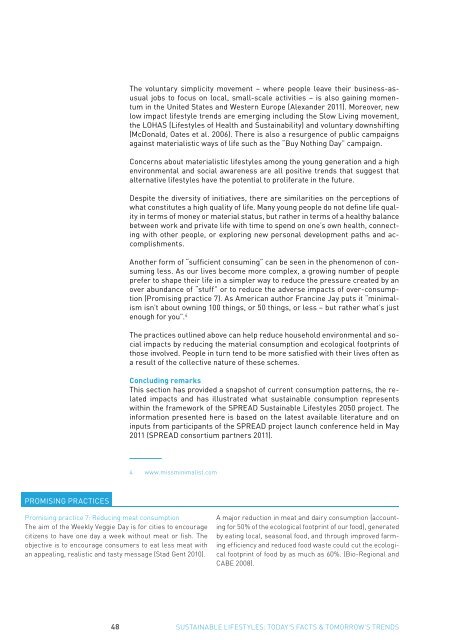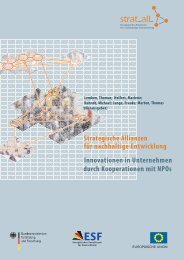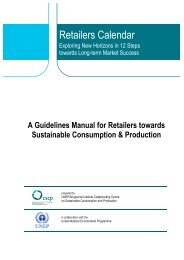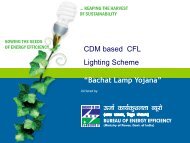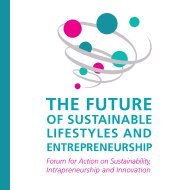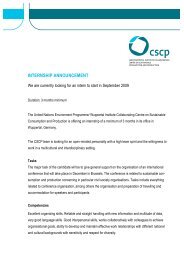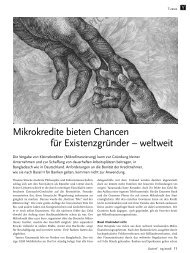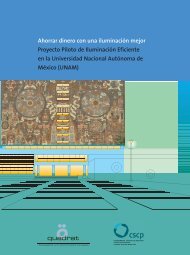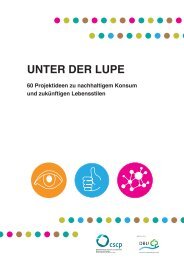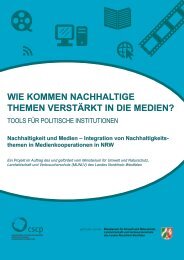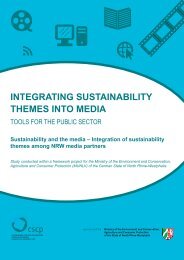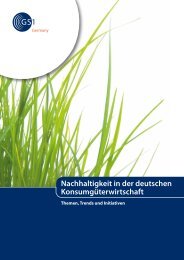today's facts & tomorrow's trends - SPREAD Sustainable Lifestyles ...
today's facts & tomorrow's trends - SPREAD Sustainable Lifestyles ...
today's facts & tomorrow's trends - SPREAD Sustainable Lifestyles ...
You also want an ePaper? Increase the reach of your titles
YUMPU automatically turns print PDFs into web optimized ePapers that Google loves.
The voluntary simplicity movement – where people leave their business-asusual<br />
jobs to focus on local, small-scale activities – is also gaining momentum<br />
in the United States and Western Europe (Alexander 2011). Moreover, new<br />
low impact lifestyle <strong>trends</strong> are emerging including the Slow Living movement,<br />
the LOHAS (<strong>Lifestyles</strong> of Health and Sustainability) and voluntary downshifting<br />
(McDonald, Oates et al. 2006). There is also a resurgence of public campaigns<br />
against materialistic ways of life such as the “Buy Nothing Day” campaign.<br />
Concerns about materialistic lifestyles among the young generation and a high<br />
environmental and social awareness are all positive <strong>trends</strong> that suggest that<br />
alternative lifestyles have the potential to proliferate in the future.<br />
Despite the diversity of initiatives, there are similarities on the perceptions of<br />
what constitutes a high quality of life. Many young people do not define life quality<br />
in terms of money or material status, but rather in terms of a healthy balance<br />
between work and private life with time to spend on one’s own health, connecting<br />
with other people, or exploring new personal development paths and accomplishments.<br />
Another form of “sufficient consuming” can be seen in the phenomenon of consuming<br />
less. As our lives become more complex, a growing number of people<br />
prefer to shape their life in a simpler way to reduce the pressure created by an<br />
over abundance of “stuff” or to reduce the adverse impacts of over-consumption<br />
(Promising practice 7). As American author Francine Jay puts it “minimalism<br />
isn’t about owning 100 things, or 50 things, or less – but rather what’s just<br />
enough for you”. 4<br />
The practices outlined above can help reduce household environmental and social<br />
impacts by reducing the material consumption and ecological footprints of<br />
those involved. People in turn tend to be more satisfied with their lives often as<br />
a result of the collective nature of these schemes.<br />
Concluding remarks<br />
This section has provided a snapshot of current consumption patterns, the related<br />
impacts and has illustrated what sustainable consumption represents<br />
within the framework of the <strong>SPREAD</strong> <strong>Sustainable</strong> <strong>Lifestyles</strong> 2050 project. The<br />
information presented here is based on the latest available literature and on<br />
inputs from participants of the <strong>SPREAD</strong> project launch conference held in May<br />
2011 (<strong>SPREAD</strong> consortium partners 2011).<br />
4 www.missminimalist.com<br />
Promising practices<br />
Promising practice 7: Reducing meat consumption<br />
The aim of the Weekly Veggie Day is for cities to encourage<br />
citizens to have one day a week without meat or fish. The<br />
objective is to encourage consumers to eat less meat with<br />
an appealing, realistic and tasty message (Stad Gent 2010).<br />
A major reduction in meat and dairy consumption (accounting<br />
for 50% of the ecological footprint of our food), generated<br />
by eating local, seasonal food, and through improved farming<br />
efficiency and reduced food waste could cut the ecological<br />
footprint of food by as much as 60%. (Bio-Regional and<br />
CABE 2008).<br />
48<br />
SUSTAINABLE LIFESTYLES: TODAY’S FACTS & TOMORROW’S TRENDS


